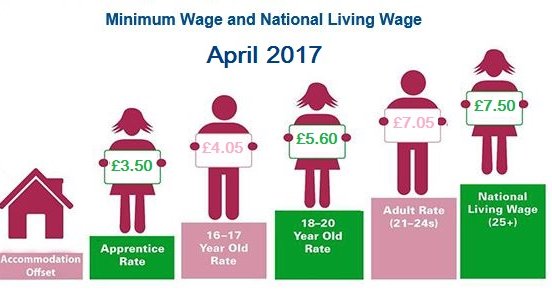
National Living Wage will be increasing from £7.20 to £7.50 per hour
If you already use Mayday Employment for the supply of your temporary labour, you may have already spoken to me or one of the Mayday team. For those who are not familiar, the National Living Wage was introduced in April 2016 and is for all working people aged 25 years and over. The rate is currently £7.20 per hour but will increase to £7.50 per hour as of 1st April 2017. This will take affect from the first full pay reference period after that date. For example, if you run a weekly payroll from Monday to Sunday, the effective date would be Monday 3rd April and not Saturday 1st April.
CHECK OUT THE VIDEO – National Living Wage explained in 30 seconds!
Government targets £9.00 per hour National Living Wage by 2020
The good news for workers on the National Living Wage is the government’s plan to increase the rate to £9.00 per hour by 2020. If this is the case, we will see significant increases each October and April going forward. This ambitious target of £9.00 per hour was made before the uncertainty of Brexit, which many are predicting will have a detrimental affect on the government plans, with the potential of economic growth being slowed after the UK’s EU exit. These thoughts may be justified as the government did initially plan the April 2017 increase to be to £7.60 per hour and not £7.50 per hour.
How the National Living Wage impacts on employers
The increases are enforced by law and HRMC can take employers to court for not paying accordingly. A leading insolvency firm stated a 23% spike in the number of companies currently paying National Living Wage saying they were financial distress. The impact on employers does have to be considered and many are keeping a close eye on future increases. As labour is generally one of the most significant cost to any business, increasing labour costs will lead to increased selling price. Following this logic, by increasing pay levels, cost of living is also increased.
National Living Wage vs. Real Living Wage
On a positive note for employers, wage increases do result in higher productivity and morale amongst workers. Many of you may also have heard of the ‘Real Living Wage’ which is £8.45 per hour. The independently-calculated Living Wage rates are announced each November, during Living Wage Week. There are employers paying the real living wage voluntarily and these companies are feeling the benefits of high productivity and better staff retention.


